Can chickens eat carrots? Yes, carrots are a great vegetable for chickens, providing them with plenty of essential nutrients and even a bit of entertainment.
Plus, they can help keep your flock entertained! Carrots have a crunchy texture that most chickens love, so they will happily peck away at one during their free-range time.
However, it is important to remember that carrots should only be given to chickens as an occasional treat. This article will cover why chickens can eat carrots, the benefits of giving them to your flock, and how to feed them safely.
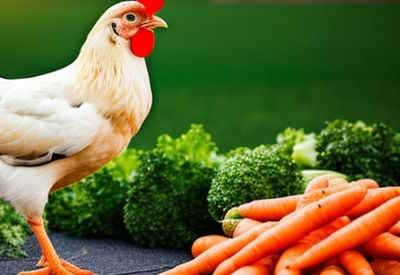
Can chickens eat carrots?
Yes, it is perfectly safe to feed carrots to your chickens. Carrots are packed with lots of nutrients that can benefit your chickens. They contain vitamins A, B6, and K and minerals like calcium and iron. The beta-carotene in carrots can help improve the quality of egg yolks and keep your chicken’s feathers in healthy condition.
However, you should limit the amount they eat since carrots are high in sugar, and they will prefer them to their regular feed. You can offer them whole or cut them into smaller pieces so that all the hens can access some.
Also, ensure the carrot is washed thoroughly before giving it to your chickens so that any potential bacteria or dirt won’t cause any harm.
[ChickenAffiliate]
The benefits of eating carrots for chickens
Carrots are an incredibly nutritious and delicious treat for chickens, providing them with essential vitamins and minerals to keep them healthy and happy. Let’s look at five incredible benefits of feeding carrots to your chickens.
Vitamin A
Carrots are an excellent source of Vitamin A, which helps keep your chicken’s eyesight sharp. Vitamin A also plays an important role in proper digestion, which helps keep your chickens healthy.
Fiber
Chickens need fiber in their diet just like humans, and carrots provide just the right amount. Fiber helps keep their digestive systems running smoothly and ensures they get all the nutrients they need from their food. Plus, the crunchiness of carrots can help clean the chicken’s beak!
Vitamin C
Enough vitamin C in your chicken’s diet is essential for maintaining its immune system. Carrots are a great source of this essential vitamin and can help give your chickens an extra boost when needed.
Minerals
Carrots contain trace amounts of iron, zinc, magnesium, and phosphorus – all necessary minerals for keeping chickens healthy. These minerals also help ensure that their feathers stay strong and glossy.
Tastiness
Lastly, let’s not forget how delicious carrots are for chickens! They love the sweet taste of this root vegetable, making it a great snack or meal addition. Not only does it taste good, but it also provides them with essential nutrition.
Things to watch out for when feeding carrots to chickens
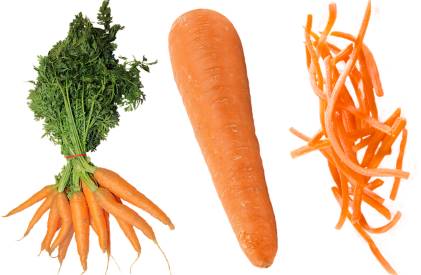
While carrots are a great food for chickens, there are some things to keep in mind when feeding them. Let’s take a look at a few important points to keep in mind.
Limit the Number of Carrots You Give Your Chickens
Chickens should not be fed large amounts of carrots as part of their regular diet. Carrots contain excessive sugar and can cause health problems if consumed in large quantities.
As such, limiting the number of carrots you give your chickens each day is best. If you choose to include carrots in their diet, ensure they only get a small portion as an occasional treat.
Avoid Giving Your Chickens Spoiled or Rotten Carrots
No matter what food you feed your chickens, it is important to ensure it is fresh and hasn’t gone bad. Spoiled or rotten food can cause health problems in chickens, so you must check any food before giving it to them.
If you have any carrots that have started to turn brown or become soft and mushy, discard them immediately.
Watch for pesticides
If you are growing your own carrots, it is essential to ensure they have not been treated with harmful pesticides or chemicals. These can be extremely dangerous for chickens and should be avoided.
Check the label for any chemicals or pesticides if you buy your carrots from the store. If in doubt, throw it out!
How often should chickens eat carrots?
Carrots are great treats for chickens, as they provide a source of vitamins and minerals. However, you mustn’t feed them too much as this can lead to them going off their regular food.
As such, you should use carrots sparingly – no more than once a week – to ensure that your chickens remain healthy. A carrot here and there will give your chickens a little nutritional boost, but it is best not to make them a major part of their diet.
How to prepare carrots for feeding to chickens
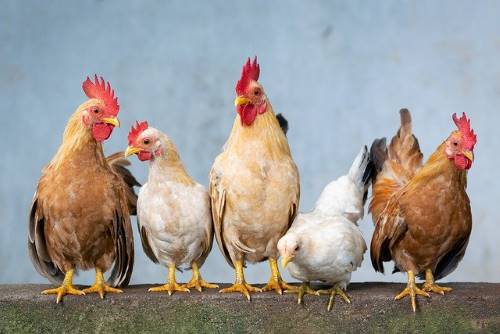
If you’re looking to give your chickens a delicious and nutritious treat, carrots may be just the thing. But before you offer them carrots, it’s important to know how to properly prepare them so that your chickens get the most benefit from this tasty treat. Read on to find out how to prepare carrots for feeding your chickens.
Wash First
It’s important to wash all vegetables before giving them to your chickens. This will help reduce the risk of bacteria or other contaminants that can make your chickens sick.
To wash carrots, rinse them under running water until any dirt or debris is removed. You don’t need to peel them; leaving the skin on will help retain more of the nutrients found in the carrot itself.
Chopping vs Whole
Carrots can be served chopped or whole – it’s really up to you and what you think is best for your birds. Some people prefer chopping their carrots into smaller pieces so they’re easier for their flock to eat and digest; however, some birds also enjoy pecking at larger pieces.
Consider which option works best for your flock when deciding how much (or how little) you want to chop up their snacks.
Cooking vs Raw
Carrots can be served either raw or cooked – both have benefits and drawbacks. Cooking carrots will reduce some of the nutrients in raw carrots; however, it makes them softer and easier for chickens with weaker beaks or digestive systems to process.
On the other hand, raw carrots are crunchy and full of vitamins and minerals that cooking would otherwise destroy. Consider which option works best for your flock when deciding whether or not you want to cook their snacks.
Can baby chickens eat carrots?
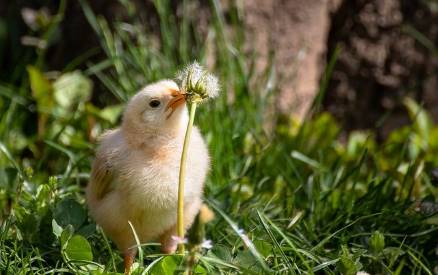
Carrots are a great source of essential vitamins and minerals, so it is safe for baby chicks to eat them. However, they should not be given too many as baby chick digestive systems need more protein than the average adult chicken – grains and insects will serve as the primary source of carbohydrates instead.
Carrots are an excellent supplement in small doses to give them additional nutrients. And since there’s no risk of harming the chicks with carrots, baby chickens can have a bit now and then for a tasty treat.
Can chickens eat carrot tops?
Carrot tops are a great choice to feed chickens as they provide an excellent source of vitamins and minerals. For example, they contain vitamins A, C, and K, potassium, and calcium. Along with the many nutrients provided, chickens enjoy the taste of carrot tops.
Carrot tops are relatively safe for chickens, so adding them to their diet is a great idea. While some other fruits and vegetables are more nutritious than carrot tops, they remain a tasty treat that most chickens love.
Can chickens eat carrot peel?
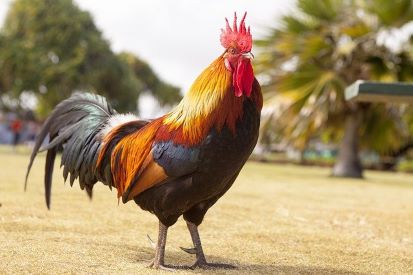
The nourishment chickens naturally get from their diet can be supplemented with cooking scraps, like carrot peels. They are a safe and highly nutritious treat for chickens if they are washed first. Carrot peelings provide a good source of vitamin A, which helps keep chickens’ eyes healthy and their feathers strong.
In addition, carrot peels contain calcium, which is essential in developing strong bones in chicks and helping chickens prevent osteoporosis. Feeding carrots peels to your chicken is the perfect way to keep them healthy while reducing food waste.
Can chickens eat canned carrots?
Canned carrots are not the best choice for chickens, as they contain salt and preservatives. A healthier option would be to feed them fresh or frozen carrots, as these would give your birds more nutrients for growth and egg production.
If you give them canned carrots once in a while, ensure that you rinse off the excess salt and preservatives before feeding them to your flock. That said, it’s generally advisable not to offer any canned vegetables regularly, so stick to the fresher options whenever possible.
What other vegetables can chickens eat?

Many people know that chickens love carrots, but is that all they can eat? The answer is no! There are many vegetables chickens can eat in addition to carrots. Let’s explore some of the most popular veggies for chickens.
Potatoes
Potatoes are a great source of fiber and carbohydrates for your chicken. You can chop them up into small pieces or even mash them before feeding them to your chicken.
Ensure you avoid putting salt or seasoning on them, as these can harm your bird’s health.
Read More: Can Chickens Eat Potatoes? The Definitive Answer
Pumpkin
Pumpkin is an excellent source of Vitamin A, which helps keep chickens strong and healthy. Pumpkins also contain plenty of calcium, which is important for healthy bones and egg production.
You can feed mashed pumpkin to your chickens or give them small chunks to peck at.
Read More: Can Chickens Eat Pumpkin? 5 Amazing Benefits
Squash
Squash contains high levels of antioxidants, which help boost your chicken’s immune system and fight off diseases more effectively than other vegetables.
To feed squash to your chickens, cut it into small cubes and offer it in their feeder tray with the rest of their food.
Read More: Can Chickens Eat Squash? 5 Awesome Benefits
Zucchini
Zucchini is a great vegetable for chickens because it contains vitamins B6 and C, phosphorus, and manganese. It also has a high water content, so it will keep your birds hydrated while eating it.
Chop the zucchini into small cubes before offering it to your birds in their feeders.
Read More: Can Chickens Eat Zucchini? 6 Excellent Benefits
Sweet Potatoes
Sweet potatoes are another great source of vitamins and minerals for chickens. They contain beta-carotene, vitamin C, magnesium, iron, and zinc – all essential nutrients for healthy birds.
To feed sweet potatoes to your chickens, mash them up or cut them into small cubes before offering them in their feeder trays with the rest of their food.
Read More: Can Chickens Eat Sweet Potatoes? 5 Important Benefits
How to give chickens a healthy and balanced diet
Feeding chickens a healthy, balanced diet is important for their growth and overall health. To ensure that your flock of chickens is properly nourished, you must provide them with an adequate diet that includes a variety of nutrient-rich foods. Let’s look at what foods make up a healthy diet for chickens and how to feed them most efficiently.
Types of Food for Chickens
Chickens will eat almost anything, but certain types of food should make up the bulk of their diet. These include grains such as oats and corn, protein-rich foods like meat scraps and insects, vegetables such as kale and broccoli, and fruits like apples and melons.
You should supplement your chickens’ diet with calcium sources like oyster shells or eggshells to help maintain strong bones and egg production. Be sure to avoid giving them any processed foods as they are not good for their health.
Feeding Frequency
How often you feed your chickens depends on their age and activity level. Generally speaking, adult chickens should be fed once or twice daily, while you should feed chicks multiple times throughout the day.
It’s also important to provide them access to fresh water to stay hydrated. If you want to offer treats, it’s best to do so in moderation, as too much sugar or fat can lead to health problems down the line.
Storage Tips
Once you have prepared your chicken’s food for the day, it’s important to store it properly, so it remains safe from pests or contamination by other animals or bacteria.
Keep chicken feed stored in airtight containers away from moisture, heat, direct sunlight, and pests such as rodents. This will help keep your chicken’s feed fresh, giving them all the necessary nutrients.
Can chickens eat carrots – final thoughts
Feeding your chickens’ carrots is safe and beneficial; they provide essential vitamins and minerals while entertaining your flock.
Remember that carrots should be fed sparingly as an occasional treat, so they don’t get too much sugar in their diet. With careful monitoring and proper nutrition management, you’ll be able to ensure that your chickens stay healthy and happy.
Related Articles:
